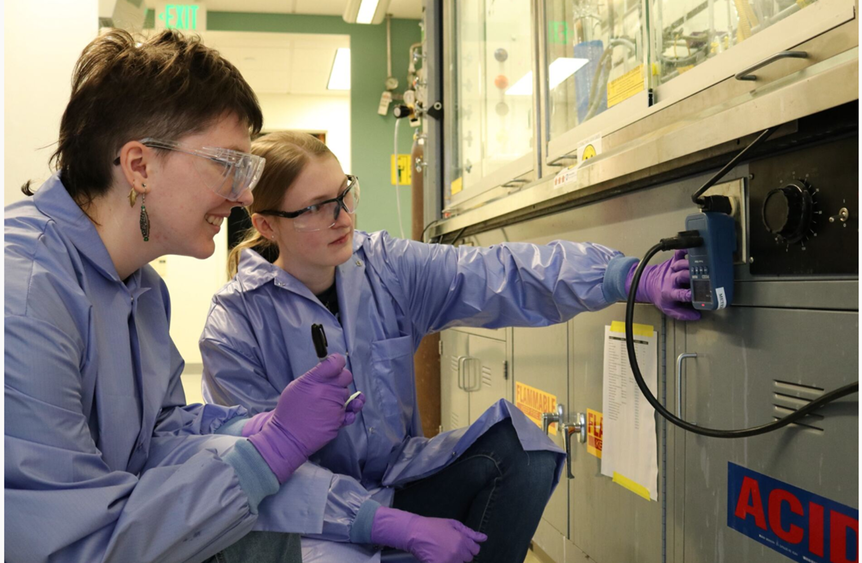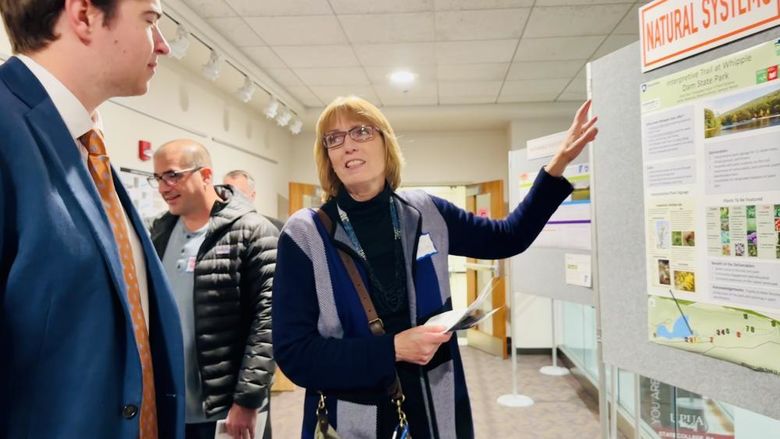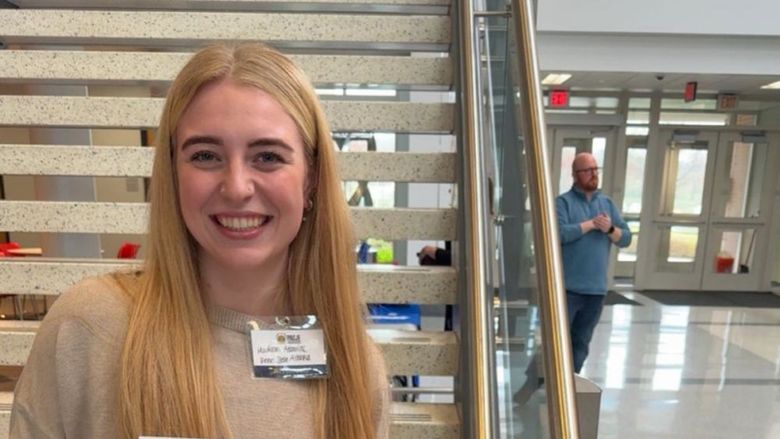
Ava Yurchak and Katherine Thompson measure equipment plug loads in Raymond Schaak’s lab in the Eberly College of Science.
UNIVERSITY PARK, Pa. — Penn State’s Sustainable Labs Program marked its second year with successes and expansion. The program provides educational support and networking opportunities to labs across the University, helping them implement changes to become more energy and resource efficient. Actions taken by participating labs are estimated to result in over $155,000 in savings for the University and reduce about 490 tons of carbon dioxide emissions annually.
Penn State partners with the nonprofit My Green Lab (MGL) and utilizes their United Nations-endorsed certification program to assess and address 14 target areas for behavioral change. Twenty-five of the 29 labs participating this year completed the MGL certification program, and 17 of them ranked in the highest three categories: Green, Platinum and Gold.
This year, the program expanded to include labs at the Altoona, Behrend, Harrisburg and Schuylkill campuses and at the Hershey College of Medicine. It was incorporated for the first time into teaching labs: a biology teaching lab at University Park with an annual enrollment of about 5,000 students and an around 25- to 50-student chemistry lab course at Penn State Schuylkill.
Of the over 2,000 labs from across the globe that have participated in the MGL program, Penn State’s engaged scholarship approach of a one-to-one undergraduate match to a research lab is unique. The second-year pilot greatly increased this cohort of undergrad consultants and demonstrated its strong appeal and benefits to both undergraduates and participating research groups. Compared to only four students in the first year, 15 labs received student support, and two additional students returned to pilot a new peer mentoring leadership role. In all, over 400 researchers, lab staff and undergraduate students were engaged in this year’s program.
The University’s Sustainable Labs Program is hosted by Penn State Sustainability, in partnership with the Center for Nanoscale Science — a U.S. National Science Foundation-funded Materials Research Science and Engineering Center — and multiple colleges. Begun in 2022, the program aligns with Penn State’s goal to become 100% carbon neutral by 2035 by focusing on changes in research labs, which represent 21% of campus space yet consume 45% of the total campus energy.
“Most of the changes to our lab practices were easy to implement, such as reminding everyone to shut down their computers or turn off the lights when they leave,” said Corrine Smolen, a graduate student and My Green Lab coordinator for Santhosh Girirajan’s lab in the Eberly College of Science. “Even our more substantial changes, such as organizing our cold storage, benefited both our research and the environment. The real culture shift, which had a significant impact on me and the whole lab, was getting everyone to discuss sustainability."
Popular actions taken by participating labs included:
- Switching out hazardous chemicals for greener substitutes and using or sharing chemicals prior to their expiration dates
- Sharing equipment and checking product inventory prior to placing orders to prevent over-purchasing
- Installing aerators on faucets and eliminating single-pass cooling to reduce water consumption, which in seven labs will save several million gallons of water annually
- Placing equipment on timers to reduce electricity plug loads
- Closing fume hood sashes when inactive
- Organizing freezer samples for quick retrieval and defrosting freezers for better efficiency
Beyond the monetary savings and environmental benefits this program produces, a few labs have incorporated the data collection results into their research. Francesco Di Gioia, assistant professor of vegetable crop science in the College of Agricultural Sciences, for example, is using data from energy meters that were part of the Sustainable Labs procedures to compare and assess the energy requirements of various plant cultivation systems and will include those findings in his research publications.
Fifteen of this year’s participating labs were each supported by a Sustainable Lab Ambassador (SLA), a paid undergraduate student trained by Penn State Sustainability staff in sustainable concepts and incorporating safety, effective communication and problem-solving strategies, project management approaches, and behavior change motivators. Each applies this knowledge and skills to support the researchers in making the lab’s chosen behavior changes.
For some SLAs, this is their first time working in a research environment.
"My experience as an SLA has taught me more about how we can be sustainable in an academic environment, which I feel gives me a more holistic understanding of sustainability,” explained Katherine Chu, an environmental resource management major in the College of Agricultural Sciences. “It has also given me the opportunity to work with a group to design solutions tailored to their needs."
Penn State’s SLA program was recognized in 2023 by the International Institute for Sustainable Laboratories for its unique approach to promoting experiential learning and environmental stewardship, and it continues to evolve. This year, two returning SLAs became mentors to this year’s cohort, improving the student training while enhancing their leadership skills.
The program leadership team is preparing for next year’s cohort of labs and SLAs. “We've learned some really valuable lessons and forged vital partnerships over the course of this year," said Jack Rumery, sustainability education and engagement specialist for Penn State Sustainability. "The enthusiastic response we’ve gotten from labs about the value they see in a program like ours fuels our belief that Penn State has a great opportunity to be a leader in the space of university green lab programs. The coming year will be a really pivotal step towards that vision.”
Any labs interested in participating next year should contact Jack Rumery at [email protected].





